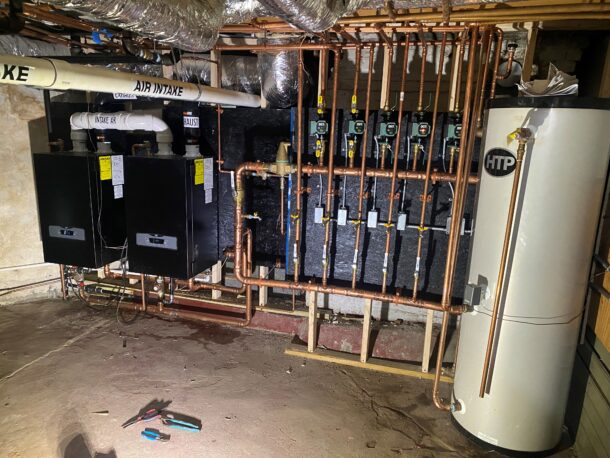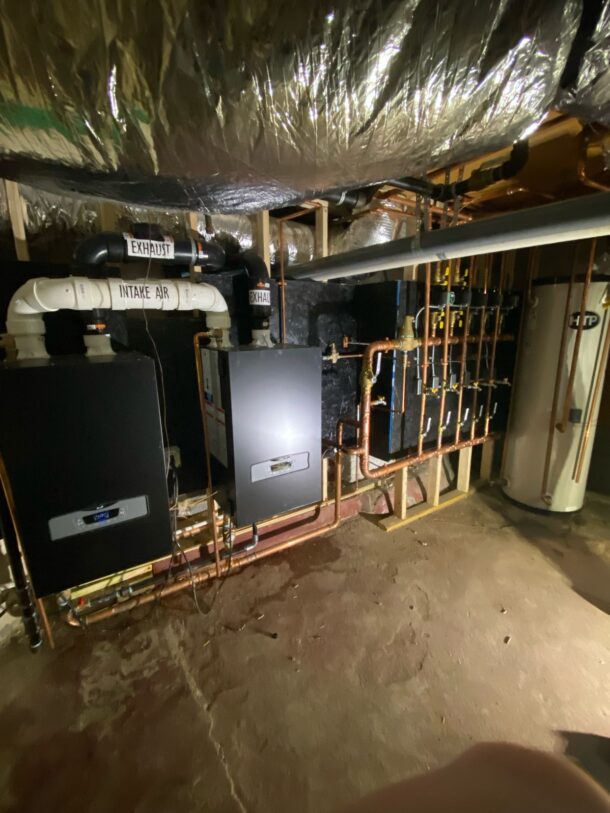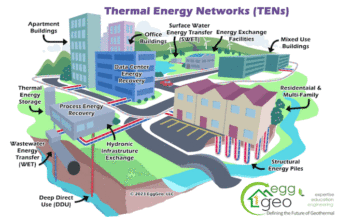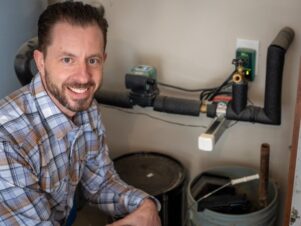Cascading System Solves Heating Challenge for Huge Home on Massachusetts Shoreline
Winters can be hard on home heating systems. Particularly so in New England coastal communities, where wind, snow and sleet, and bone-chilling temperatures force systems to work massive overtime. New England in summer is special. Winters? Not so much.
In older homes it can be particularly difficult to maintain heat throughout the house, especially in the region’s expansive, multi-story structures. Put all the ingredients together, and home heating contractors in New England and other frosty locales find it a challenging task to ensure everyone’s thermal comfort.
Working with Emerson Swan, the team at Jeff Potvin Plumbing & Heating installed a solution that uses cascading as an efficient heating source for a 4,000 square foot house, which was built in the late 1800s. “The homeowner had two 250K BTU boilers, but they were pretty old and worn out,’’ Potvin said. “It was time for a new system.”
Uncomplicated Install
To replace the existing boilers, Potvin’s team installed two Ariston HTP ELU 199K boilers. The boilers will provide heat for a house that includes five bedrooms and six baths. The house is steps away from Preston Beach in Marblehead, Mass., and the spacious living room overlooks the ocean. By every real estate metric, it is a premium property in a highly coveted location.
But with the heating units breaking down, it was critical to implement a new system. Potvin’s team decided to install a pair of cascaded boilers to help the homeowner maximize efficiency.
“These boilers are uncomplicated to install due to the large cavity inside, which will enable us to service its components in the future,’’ Potvin said. “We had a fluing issue, but we cascaded the boilers and also vented them, which solved the problem.”
One of the concerns for the homeowner was the noise of the units. The mechanical room is located near a living area. “One of the benefits of the HTP ELU boilers is they are very quiet,’’ Joe Savignano of Emerson Swan said. “They are common in European homes, and they are made to be super quiet. Even with a 3-way valve moving, you don’t hear a thing. The homeowner was pleasantly surprised by how quietly they operated.”

Jeff Potvin Plumbing & Heating installed two Ariston HTP ELU 199K boilers in a cascaded system to heat a 4,000 square foot house in Massachusetts.
Critical Redundancy
The benefit of the cascading system is that it ensures redundancy, so that a building or home retains access to hot water for heating in the event of a failure.
Cascading involves using multiple units to solve demand issues when one unit is incapable of generating the amount of heat required. Before installing a cascading system, it is important for the contractor to know the BTU heat load calculation. A bigger structure will generate more heat demand.
For example, a building might have a 10 million BTU heat load calculation. An Ariston HTP Elite Ultra XL boiler provides 2 million BTUs and would require five of them to meet the heating capacity of the building when 100 percent of the load is demanded.
Most of the time, however, 100 percent of the load is not required, and less heat is needed in short term duration. A zone might come on in the system that calls for 2 million BTUs. With cascading, all five boilers act as one to meet the demand. If the building needs 100 percent of the heat, all five units would fully activate.
One unit orchestrates the activities of an entire group. HTP calls it a Master and Follower installation. Follower heaters are controlled by the master unit and dictates when all units operate. Most cascade systems have lead/lag rotation grouping to spread the demand load evenly so that no one unit is used more than the others.
Worry-free system
For homeowners and businesses, cascading systems ensure hot water delivery when maintenance is required or unplanned downtime temporarily disables one of the units. That’s particularly important for a New England home, where a boiler stoppage in the middle of the night could lead to burst pipes, unheated bedrooms, and angry customers.
In the maintenance cycle, a building might use 5 boilers to produce 10 million BTUs of hot water. After two years, the first boiler is taken out of operation for maintenance. With the cascade design, the building can manage day to day activities to keep hot water available to the entire building with just four boilers.
If a unit fails due to an error code, the other units in a cascade system meet the demand. If a business has just one boiler for daily operations, and it fails or needs maintenance, the business must close. Homeowners who lose their heat might need to find temporary, alternative living arrangements until the heat is restored.
Cascading also spreads the load across multiple units, so that all boilers are actively supporting each call. HTP’s Elite Series has programming that shifts loads of a heat call when the first unit gets to 80 percent operation. Once a boiler hits that mark, it will split, and another unit will fire to divvy up the demand call.
Some units even include rotation clocks. Elite Ultra models can be programmed for specific hours of operation. For example, one boiler can be programmed for 6 hours. When that time expires, the next boiler in the rotation picks up the next 6-hour shift. By ensuring that all units are used equally, the system needs less maintenance and individual components will last far longer.

The cascaded system ensures redundancy, and multiple units solve demand issues when one unit is incapable of generating the amount of heat required.
Various applications
Cascading systems can be used in commercial and residential jobs. Hotels, hospitals and office buildings have high demand, so cascading systems give them an efficient and reliable option to meet that demand. The expansive Massachusetts home is also the perfect setting for a cascading system.
“One of the things that I like about the Elite Ultra is it’s the easiest to control,’’ Savignano said. “The Wi-Fi function enables remote monitoring of the system.”
Another residential application might be for a home that includes a snow melt system for the driveway. The heat load for the home could be 130,000 BTUs for the house and 250,000 BTUs for the driveway. The solution could be individual systems, or two Elite Ultra-199WBN models to cover the total heat load.
One more application demonstrates the benefit of a cascading system. An apartment complex in Derry, N.H. installed three Elite Ultra boilers in a tight footprint for an apartment complex. By using multiple units, installers have greater flexibility in irregular spaces. The mechanical room for the apartments had limited space, so a cascading system proved to be a good solution.
Potvin’s client can rest comfortably, knowing that the cascading system will keep the family comfortable all winter long. “This system made perfect sense for this job,’’ Potvin said. “We use the HTP products a lot for our jobs. They’ve got a good support system, and the Elite Ultra interface is easy to use and is remarkably efficient. It’s a durable product and the homeowner won’t have to worry about heating the home for a long time.”
Guest Author is Thomas Renner, who writes on a variety of trade industry topics for publications throughout the United States.




Join the conversation: